All UO students have opportunities to conduct original scholarly research as part of their course work here. And with the help of skilled professors and librarians along with access to thousands of resources via UO Libraries, the diversity of topics they can explore is vast. Though not all the research projects can be award worthy, this year, five were.

Stellar students tackled topics from labor organizing to women’s collectives on rural land, cultural reproduction to vaccine hesitancy, and gender nonconformity in Ancient Greece.
These five students will present their research findings and accept their Libraries Award for Undergraduate Research Excellence (LAURE) on October 25 at a celebration in the Knight Library Browsing Room from 3 to 5 p.m. All are welcome!
“Investigating the world around us—whether in its current, past, or future condition—is both an art and a skill. We hope that’s what our students are learning here at the University of Oregon. This award lets us know that our students are taking this to heart. They are learning the craft of research, and they are excelling in their academic work and beyond,” said Dean Walton, the Lorry I. Lokey Science and Technology Outreach Librarian and 2023 LAURE award coordinator.
Meet the 2023 LAURE Winners
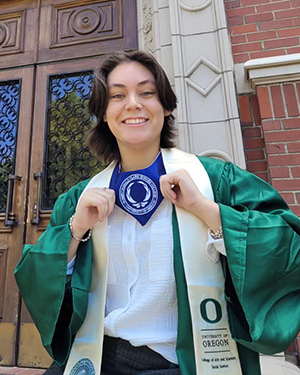 Katie Cross
Katie Cross
"Building Community Solidarity: The 1988-90 Strike of the Morgan-Nicolai Door Factory and the Creation of the Eugene-Springfield Solidarity Network "
Faculty sponsor: Gordon Lafer, Labor Education and Research Center
URL: scholarsbank.uoregon.edu/xmlui/handle/1794/28661
Cross’s research—done for her thesis while in the Clark Honors College and interning at the UO’s Labor Education and Research Center—focused on the discovery and documentation of a strike that took place in Springfield, Oregon, during the late 1980s. Though the labor strike failed, it gave rise to the Eugene-Springfield Solidarity Network, a community advocacy group still active today. Cross posited that the strike was a “successful failure,” based on research by Eve S. Weinbaum described in To Move a Mountain: Fighting the Global Economy in Appalachia.
“In previous class projects, the library was a resource to find sources that would support the argument I was already trying to make. But in this case, the library acted more as a place to find the puzzle pieces needed to put together those stories. My usage of the library’s digital and microfilm databases helped me put together the frame of my project and discover the words and faces of those who covered the event at the time. Without the library’s resources, it would have been nearly impossible to complete my project in a satisfying manner. So, the next time I find myself wanting to discover a long-forgotten story, I will know the first place to look,” Cross shared in her application essay.
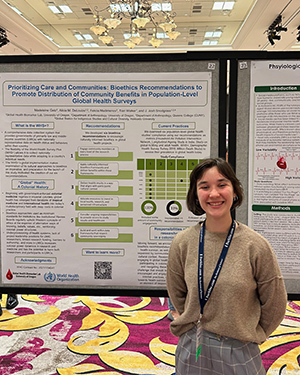
Madeleine Getz
"Rural Relationships on the Oregon Women’s Lands "
Faculty sponsor: Judith Raiskin, Women's, Gender, and Sexuality Studies
URL: scholarsbank.uoregon.edu/xmlui/handle/1794/28979
Getz came to her research by taking a history class called Out in the Archives: Preserving LGBTQ History, co-taught by Judith Raiskin and Linda Long, manuscripts curator in UO Libraries.
In the 1970s, there was a sort of lesbian migration to Oregon, where women hoped to establish collectives living on “women’s land.” Full-time collective residents seemed to idealize rural spaces in their personal and public communications, connecting rural living to values of self-sufficiency, liberation, and socialism. Despite these pronounced views, many women had to work in the surrounding local communities to help support their collectives financially. This created tension between rural idealism and the realities of rural living and in the relationships full-time collective residents had with surrounding communities. Getz examined this tension.
“Very little scholarship exists on the Oregon women’s lands, and I felt privileged to be able to contribute to this growing body of work. My research not only grew from independent work in the University Special Collections and Archives and the unrestricted access I was given to those resources, but also from my own lived experience in rural space,” Cross shared in her application essay.
She added, “Working in the library’s collections helped me grow practical, demonstratable skills like understanding copyright law and developing qualitative research projects. But it also helped me understand that research is, at its heart, about people. … At the end of the day, we are responsible for accurately and respectfully telling stories about people.”
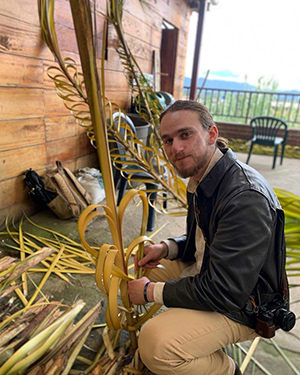
Rowan Glass
Reweaving the Uaman Luar: Cultural Reproduction and Contested Autonomy among the Kamëntšá
Faculty sponsor: Reuben Zahler, Maria Fernanda Escallón, Department of Anthropology, College of Arts and Sciences
URL: scholarsbank.uoregon.edu/xmlui/handle/1794/28957
Glass—who is winning the LAURE for the second year in a row—conducted his undergraduate thesis fieldwork in the Sibundoy Valley in Columbia in summer 2022 and February 2023. He produced his final thesis for the Anthropology Honors Program. In it, he interprets processes of cultural reproduction among the Kamëntšá, a culturally and linguistically unique people of southwest Colombia. Building on ethnographic data collected during his three months of fieldwork with artisans, shamans, land defenders, and community members in the Sibundoy Valley, Glass argues that “the Kamëntšá, while facing cultural, political, and ecological threats on multiple fronts, are engaged in the integral reproduction of their culture to ensure the survival and vitality of their community.”
Glass speaks fondly of his experiences growing his research skills, saying in his winning essay, “My research skills—from conventional library research to archival methods, ethnography, and exhibit curation—developed considerably during my time at the UO. Given the many ways in which I’ve benefitted from the resources and personnel at UO Libraries, my research accomplishments would not have been possible without them.”
Though planning to attend graduate school in 2024, Glass chose to do a gap year after graduating last spring and has been making the most of it, including attending the Athens Summer School in Visual Ethnographic Practices and producing an anthropological documentary.
Learn more about Glass and his research in this Oregon Quarterly story.
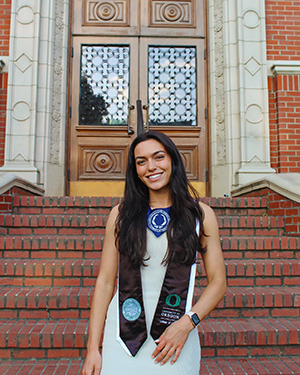 Devan McClain
Devan McClain
Information Sources and Covid-19 Vaccine: Hesitancy in Adults with Disabilities
Faculty sponsor: Nicole Ngo, School of Planning, Public Policy and Management
URL: scholarsbank.uoregon.edu/xmlui/handle/1794/28750
In her research—done in part while working as a Disability and Public Health Research Intern—McClain explored vaccine hesitancy in people with disabilities. McClain investigated COVID-19 vaccine and booster hesitancy, sources of public health information, vaccination and hesitance rationales, misinformation susceptibility, and political ideology by expanding upon the 2021 COVID-19 and Vaccine Survey Project from the American Association on Health & Disability.
The findings became the subject of McClain’s honors thesis for the Robert D. Clark Honors College and School of Planning, Public Policy, and Management last spring.
“The success of my project was fundamentally dependent upon my access to library-provided materials that reinforced the value of digital scholarship, enhanced my abilities in data analysis, granted the access licenses to hundreds of publications, and guided my inquires through databases and research guides,” said McClain.
Before applying to graduate school, she plans to spend the next several years volunteering alongside community health workers in rural Kenya, sharing, “It is my hope that this time will supplement my passion for integrated approaches to healthcare with practical experience, as well as set me up for acceptance into a Master of Public Health program.”
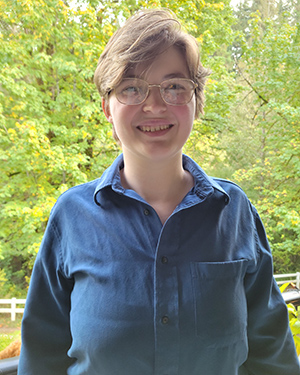 Ren Reed
Ren Reed
Harmony and Matrimony: A Cameo of Hermaphroditus
Faculty sponsor: Ashley L. Bacchi, Starr King School for the Ministry
URL: scholarsbank.uoregon.edu/xmlui/handle/1794/28980
Reed examines a cameo ring featuring Hermaphroditus, dated between 150 and 100 BCE, looking at the common uses of similar rings, subject matter, and references to Hermaphroditus within the historical record, all of which indicate a romantic use.
Reed’s research, begun for a class on the representations of the body in the ancient Mediterranean, has now won its third award. First was the Amy & Ross Kari Travel Grant to present the work at a conference, then the Marian C. Donnelly Book Prize for Best Term Paper, and now the LAURE.
“I found a wealth of material at the Design Library. Within a few minutes, I was sitting at a desk with stacks and stacks of books on the jewelry of antiquity. … The depth of knowledge available at the Design Library was incredible. The value of having such an exceptional field-specific library at my immediate disposal cannot be understated,” Reed shared.
About the LAURE
The UO Libraries’ Award for Undergraduate Research Excellence (LAURE) recognizes undergraduate students who demonstrate excellent library research skills with a $1,500 scholarship (currently enrolled students receive awards as scholarships and recent graduates receive a cash award).
Established in 2004, LAUREs are given in two categories:
- Single-term papers and projects from a 200-level or above course
- Theses or multiterm papers and projects
Research projects from all disciplines are welcome. Previous award winners represent a wide variety of academic disciplines, including Anthropology, Art History, Environmental Studies, International Studies, Religious Studies, and General Science.
The Awards Committee, composed of UO faculty librarians and other library personnel, reviews applications once a year. Interested applicants and faculty members wishing to encourage their students to apply for the LAURE can find the details about requirements, judging criteria, and timelines in the research guide about the LAURE award. They can also learn more about previous LAURE winners.
The LAURE is made possible through generous donations from Milton and Barbara Sparks, and Lisa and Jon Stine.
“We thank our donors for helping to honor our student colleagues and the willingness of those students to share their research experiences,” said Walton.
Have questions? Visit Libraries' Award for Undergraduate Research Excellence or contact Dean Walton.
—By Kate Conley, communications specialist, UO Libraries
